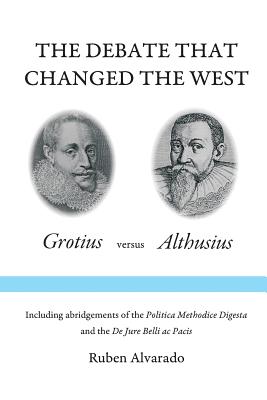The Debate that Changed the West: Grotius versus Althusius

The Debate that Changed the West: Grotius versus Althusius
At the dawn of the modern age a debate took place that would determine the further course of Western and thus world civilization. This debate did not take place in any assembly or debating chamber. It took place in the hearts and minds of the trend-setting intelligentsia of the day.Two figures engaged in this debate, acting as signposts at the crossroads which materialized in the late 16th and early 17th centuries, when a decision loomed and a path had not yet irrevocably been embarked upon. They functioned at the time and place destined to be the stage upon which this decision would become apparent: in and around the Dutch Republic in its struggle for freedom from the Spanish monarchy. They shared the same inheritance, constraints, and influences; the one fashioned it in a way that proved a resounding success which would be received as orthodoxy, the framework of right-thinking people for centuries to come; the other in a way that, although offering a coherent and constructive alternative, languished in obscurity, only in our day receiving renewed interest from the scattered flock of academics and churchmen (and women) who either make the knowledge of such things their business, or share a wistfulness for and inkling of this world we have lost.The one is Hugo Grotius, world renowned, the so-called "Father of International Law." Although the appropriateness of such an appellation has been drawn into well-deserved doubt in our time, what should not be in doubt is the paradigmatic role his work played in the course of our civilization. Grotius fashioned the synthesis of the socio-political-legal-constitutional materials, the harvest of centuries of scholarship, into the familiar modern shape, which this book will explore in extenso. It is his path that was chosen, his seed that has now reached harvest time.The other is Johannes Althusius, forgotten by the Enlightenment but restored to honor in the 19th century by the German "revivalist" of associationalism Otto von Gierke. Althusius drew on the same source materials as Grotius to fashion his own synthesis of political, legal, and constitutional thought, a synthesis which then fell into abeyance as its competitor synthesis triumphed, but which in our day has enjoyed a renaissance that promises a theoretical renewal of our understanding of constitutionalism and the rule of law.These two men encapsulate the conflict of Western civilization. The path of the one was taken, the path of the other eschewed. For
PRP: 166.79 Lei
Acesta este Prețul Recomandat de Producător. Prețul de vânzare al produsului este afișat mai jos.
133.43Lei
133.43Lei
166.79 LeiLivrare in 2-4 saptamani
Descrierea produsului
At the dawn of the modern age a debate took place that would determine the further course of Western and thus world civilization. This debate did not take place in any assembly or debating chamber. It took place in the hearts and minds of the trend-setting intelligentsia of the day.Two figures engaged in this debate, acting as signposts at the crossroads which materialized in the late 16th and early 17th centuries, when a decision loomed and a path had not yet irrevocably been embarked upon. They functioned at the time and place destined to be the stage upon which this decision would become apparent: in and around the Dutch Republic in its struggle for freedom from the Spanish monarchy. They shared the same inheritance, constraints, and influences; the one fashioned it in a way that proved a resounding success which would be received as orthodoxy, the framework of right-thinking people for centuries to come; the other in a way that, although offering a coherent and constructive alternative, languished in obscurity, only in our day receiving renewed interest from the scattered flock of academics and churchmen (and women) who either make the knowledge of such things their business, or share a wistfulness for and inkling of this world we have lost.The one is Hugo Grotius, world renowned, the so-called "Father of International Law." Although the appropriateness of such an appellation has been drawn into well-deserved doubt in our time, what should not be in doubt is the paradigmatic role his work played in the course of our civilization. Grotius fashioned the synthesis of the socio-political-legal-constitutional materials, the harvest of centuries of scholarship, into the familiar modern shape, which this book will explore in extenso. It is his path that was chosen, his seed that has now reached harvest time.The other is Johannes Althusius, forgotten by the Enlightenment but restored to honor in the 19th century by the German "revivalist" of associationalism Otto von Gierke. Althusius drew on the same source materials as Grotius to fashion his own synthesis of political, legal, and constitutional thought, a synthesis which then fell into abeyance as its competitor synthesis triumphed, but which in our day has enjoyed a renaissance that promises a theoretical renewal of our understanding of constitutionalism and the rule of law.These two men encapsulate the conflict of Western civilization. The path of the one was taken, the path of the other eschewed. For
Detaliile produsului










